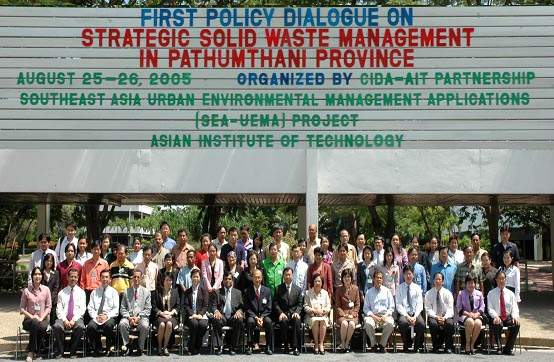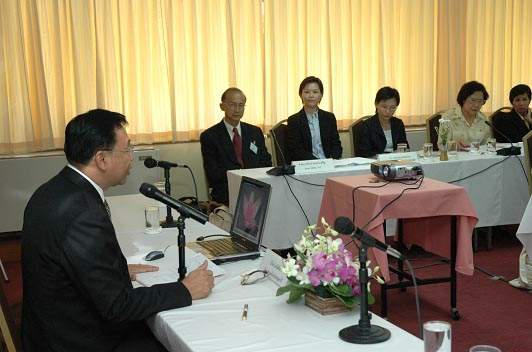First Policy Dialog in Solid Waste Management at AIT
The CIDA-AIT Partnership (2003-2008) SEA-UEMA Project of UEM Field of Study held its First Policy Dialog on Strategic Solid Waste Management in Pathumthani Province on August 25-26, 2005 at the AIT Conference Center. Prof. Chongrak Polprasert, Dean SERD, in his opening remarks stressed on the need of discussion on urban policy issues in the province and welcomed the initiative by the project. The event was inaugurated by Mr. Boonyun Khamhong, Chief of the Governor's Office, on behalf of the Governor of Pathumthani. He highlighted the importance of sustainable solid waste management (SWM) in the province and the progress being made in that direction. The keynote speaker, Mr. Paisan Padungsirikul, Head of SWM Division, Pollution Control Department, Bangkok outlined the policies, plans and strategies of the Thai government for effectual management of solid waste in urban and peri-urban areas of the kingdom. Later, Hon. Niwat Sawatkaew, the Pathumthani Governor honored the project by his presentation on general outlook of the existing MSW scenario in the province and highlighted strategies being used to make it free of solid waste in a sustainable way.

Participants of the policy dialog with Hon. Niwat Sawatkaew (seated, 9th from left), Pathumthani Governor; Mrs. Thongkorn Hiranraks (seated, 10th from left) , Development Officer, Canadian Embassy representing CIDA; Prof. Chongrak Polprasert (seated, 8th from left), Dean SERD representing AIT and Dr. Ranjith Perera (seated, 7th from left), SEA-UEMA Project Director.

Hon. Niwat Sawatkaew (left) presents the SWM policy strategy for Pathumthani

Participants in a parallel group discussion
The policy dialog workshop, organized in Thai language aimed to understand problems, policies, and strategies of SWM; understand lessons learned from effective policy implementation, and policies arising out of good practices; discuss problems/constraints in policy implementation; and make recommendations. The participants were policy makers, policy implementers and planners at the local and provincial levels, NGOs and CBOs, corporate and private sectors involved in SWM, and academicians. The two-day workshop discussed national SWM strategies and policies, and the establishment of framework for translating them into implementation as well as for deriving policies from good practices in solid waste management.
The group discussion was able to bring out the problems of SWM in the province. The revelation of the current problems and the review of the policies showed the gaps at different levels - Central, Provincial and Local government levels. The priority issues agreed for initial strategic SWM planning to solve such problems were: building awareness to change the people's attitudes; appropriate planning for stakeholder participation; exchange of information between organizations and creation of SWM network in the province; promotion of technical know-how and knowledge sharing with the stakeholders; and increasing human and financial resources to promote integrated waste management in Pathumthani Province.
